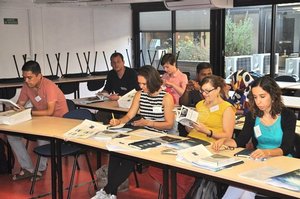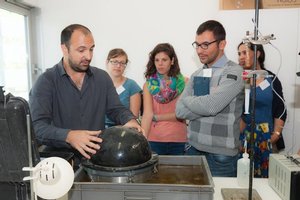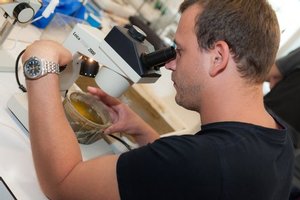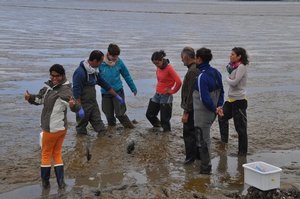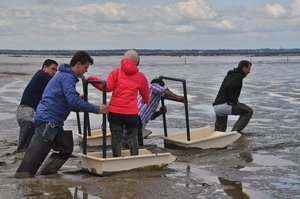Ecole d'été : "Ecologie des micro-algues et des mollusques des zônes côtières"
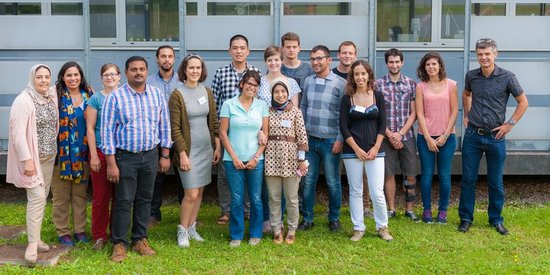
Du 1er au 4 septembre 2015, 16 étudiants (en doctorat, post-doctorat ou master 2) ont été sélectionnés et se sont réunis autour d'experts internationaux sur le thème de l'écologie des micro-algues et des mollusques des zônes côtières.
LES PARTICIPANTS
Pas moins de 12 nationalités différentes pour ces 16 étudiants, dont 3 d'entre eux poursuivent actuellement leur études à Nantes. Ils proviennent d'horizons aussi variés que la Tunisie, le Maroc, l'Indonésie, l'Allemagne, l'Italie, la Biélorussie, l'Autriche, la Chine, l'Ecosse, le Portugal, l'Inde et la France.
Les intervenants quant à eux provenaient du Portugal, du Danemark, du Canada, de France, d'Espagne et des USA. Merci à Lourenço RIBEIRO, Michaël KÜHL, Cédric HUBAS, André MALLET, Nicolas CHOMERAT, Santiago FRAGA, Philippe SOUDANT, Patricia TESTER, Romain GASTINEAU, Sébastien LEFEBVRE, Véronique SECHET, Philipp HESS, Bruno JESUS, Vona MELEDER, Laurent BARILLE, Priscilla DECOTTIGNIES et Bruno COGNIE.
LE PROGRAMME (à télécharger en fin d'article)
Les matinées ont été consacrées aux cours théoriques, tandis que les après-midis ont permis d'initier les étudiants à des techniques de pointe grace à des travaux pratiques en laboratoire. Une sortie de terrain lors du dernier jour leur a permis de tester leurs nouvelles connaissances en conditions réelles !
Cours théoriques dans les locaux d'IFREMER
TP dans les labos de MMS
TP dans les labos de MMS
TP sur le terrain
TP sur le terrain
Des photos sont mises en ligne sur le site web du laboratoire MMS : cliquez ici
LES ETUDIANTS TEMOIGNENT :
Note moyenne du contenu scientifique de l'école d'été : 8,6 / 10
Note moyenne de l'organisation de l'école d'été : 9 / 10
Note moyenne de correspondance avec leurs objectifs : 8,3 / 10
Tous confirment que l'école d'été a été utile à l'élaboration de leur réseau professionnel.
Tous confirment qu'ils auront l'utilité dans leurs futures études du contenu scientifique et des techniques apprises, en particulier :
- spatt sampling, HPLC, culturing techniques
- Surely the Coulter Counter for following cell culture growth and maybe the windows screen for sampling microalgae
- Techniques d'analyse des Biotoxines Marines / Culture des espèces phytoplanctoniques.
- the benthic HABs techniques and scientific knowledge is very useful to me.
- I hope to use my new knowledge about photobioreactors in my PhD to do some growth studies more quickly.
- Artificial substrate for sampling benthic microalgae / Passive sampling of phycotoxins (SPATT) / Taxonomic identification with thecal plates / Use of the Coulter counter
- Potentially solid phase passive sampling for toxins
- There are many parts that could be useful for my future science studies. First, technique sampling method from Patricia Tester about dinoflagellate can used too for diatom sampling within need longer time than dino. Then, from Romain Gastineau about diatom spesies which is can produce specific pigment and whole of aquaculture. Then from Bruno Jesus and Vona about prymary productivity of diatom measuring technique and pigment analysis.
- Sampling techniques used for the harmful benthic dinoflagellates, SPATT bag analysis,HPLC pigment analysis
- Pigment analysis / Sampling of microphyobenthic biofilms / Microscopic analysis
Ce qu'ils ont préféré :
- Good group size (not too many people). No lectures in the afternoon, but practical things. To see all the facilities. Well organized. Good supply with papers, literature (thanks for the benthic dinoflaggelates book) and food :) The oysters were amazing :)
- The fact that the speakers came from all over the world and talked about topics that fit perfectly the subject of my PhD thesis. And the field trip, for sure!
- Aspect organisationnel / Aspect communicatif / Aspect pratique (Workshop) / Echange d'informations, de cultures entre différents pays.
- Everything! The organization, the classes, the availability of all the scientific team, the relationship with the other students and the food :)
- I liked how practical it was, and how many different researchers it involved.
- The hospitality / The organisation and the good documents provided / The practical part and the field trip (it was not restricted to theory).
- Good relevant programme, good balance between lectures and practicals; very qualified and motivated teachers; good timely organization and financial support.
- So many aspects. First, the programme organization was very clear, detail, and, on time. Secondly, the content of subjects are relevant with my field science, and the very important thing that the speaker are really professional, expert, kind, and easy going. I get really a lot of experiences from this program. Lastly, the summer school comittee are very welcome, helpful, and friendly. I also met collegue from various countries so make it possible to build collaboration or link one day.
- Practical sessions and lab visit helped to understand the techniques of sampling for the benthic dianoflagellates
- The proportion of theoretical (presentations) to practival content was good. There was always enough time to network and to discuss projects and ideas. In particular I liked the connection to applied aspects, fx the visit of the oyster farm.
Télécharger Programme.pdf
